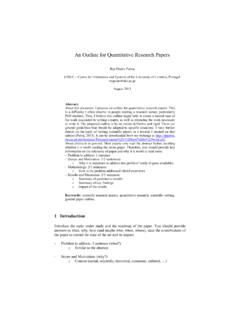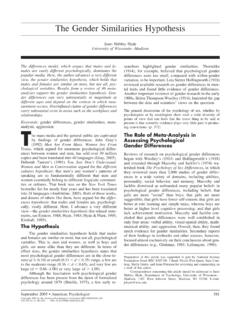Transcription of DAC CRITERIA FOR EVALUATING DEVELOPMENT ASSISTANCE …
1 DAC CRITERIA FOR EVALUATING . DEVELOPMENT ASSISTANCE . When EVALUATING programmes and projects it is useful to consider the following DAC. CRITERIA , as laid out in the DAC Principles for Evaluation of DEVELOPMENT ASSISTANCE : RELEVANCE. The extent to which the aid activity is suited to the priorities and policies of the target group, recipient and donor. In EVALUATING the relevance of a programme or a project, it is useful to consider the following questions: To what extent are the objectives of the programme still valid? Are the activities and outputs of the programme consistent with the overall goal and the attainment of its objectives? Are the activities and outputs of the programme consistent with the intended impacts and effects? EFFECTIVENESS. A measure of the extent to which an aid activity attains its objectives. In EVALUATING the effectiveness of a programme or a project, it is useful to consider the following questions: To what extent were the objectives achieved / are likely to be achieved?
2 What were the major factors influencing the achievement or non-achievement of the objectives? EFFICIENCY. Efficiency measures the outputs -- qualitative and quantitative -- in relation to the inputs. It is an economic term which signifies that the aid uses the least costly resources possible in order to achieve the desired results. This generally requires comparing alternative approaches to achieving the same outputs, to see whether the most efficient process has been adopted. When EVALUATING the efficiency of a programme or a project, it is useful to consider the following questions: Were activities cost-efficient? Were objectives achieved on time? Was the programme or project implemented in the most efficient way compared to alternatives? DAC CRITERIA FOR EVALUATING DEVELOPMENT ASSISTANCE . IMPACT. The positive and negative changes produced by a DEVELOPMENT intervention, directly or indirectly, intended or unintended. This involves the main impacts and effects resulting from the activity on the local social, economic, environmental and other DEVELOPMENT indicators.
3 The examination should be concerned with both intended and unintended results and must also include the positive and negative impact of external factors, such as changes in terms of trade and financial conditions. When EVALUATING the impact of a programme or a project, it is useful to consider the following questions: What has happened as a result of the programme or project? What real difference has the activity made to the beneficiaries? How many people have been affected? SUSTAINABILITY. Sustainability is concerned with measuring whether the benefits of an activity are likely to continue after donor funding has been withdrawn. Projects need to be environmentally as well as financially sustainable. When EVALUATING the sustainability of a programme or a project, it is useful to consider the following questions: To what extent did the benefits of a programme or project continue after donor funding ceased? What were the major factors which influenced the achievement or non-achievement of sustainability of the programme or project?
4 Sources: The DAC Principles for the Evaluation of DEVELOPMENT ASSISTANCE , OECD (1991), Glossary of Terms Used in Evaluation, in Methods and Procedures in Aid Evaluation', OECD (1986), and the Glossary of Evaluation and Results Based Management (RBM) Terms, OECD (2000). DAC CRITERIA FOR EVALUATING DEVELOPMENT ASSISTANCE .
















